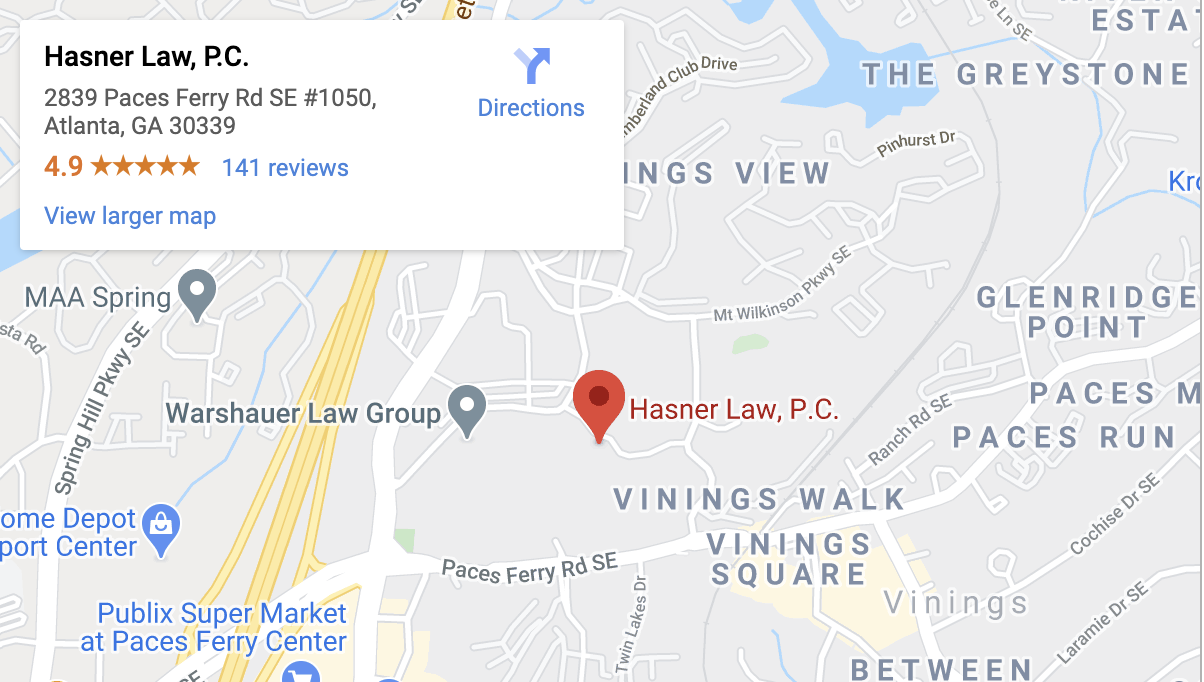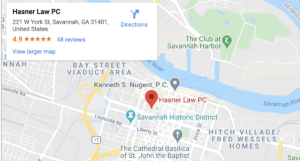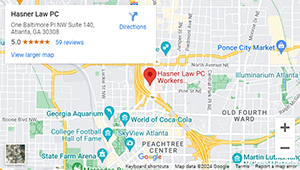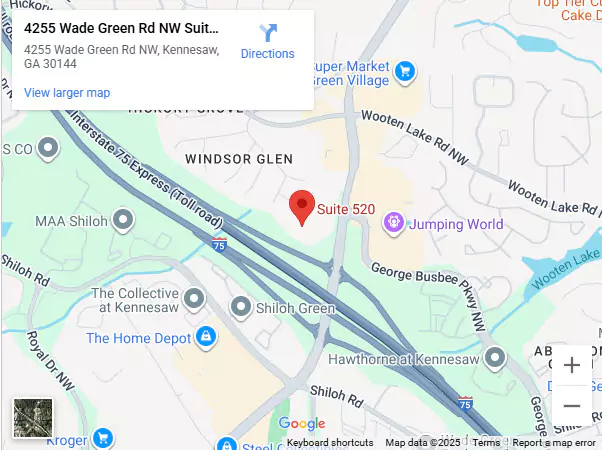Commercial truck collisions often result in serious injury, extended hospitalization, and significant financial strain. Those involved may experience long-term health complications, reduced earning capacity, or ongoing rehabilitation. In Georgia, individuals harmed in truck accidents caused by the negligent conduct of others may be entitled to seek compensation through a personal injury claim or civil lawsuit.
Hasner Law represents clients in Kennesaw and across Cobb County injured in truck crashes involving 18-wheelers, commercial delivery vehicles, or other large freight carriers. Our law firm helps injured truck victims with insurance claims, liability analysis, and court filings. Each matter is approached based on the unique facts of the collision and applicable state and federal regulations.
If you or someone close to you has been injured in a truck accident near Kennesaw, contact Hasner Law at 678-293-0284 for a free consultation with an experienced Kennesaw truck accident lawyer.
Kennesaw Truck Accident Guide
- Why Hire a Truck Accident Lawyer From Hasner Law?
- Common Causes of Truck Accidents in Kennesaw
- What Compensation Is Available After a Truck Accident in Kennesaw?
- Who May Be Held Liable in a Georgia Truck Accident Claim
- What is the Legal Process for Filing a Truck Accident Claim in Kennesaw?
- Time Limits to File a Truck Accident Lawsuit in Georgia
- What to Do After a Truck Accident in Kennesaw
- Schedule a Free Consultation With a Truck Accident Attorney in Kennesaw
Why Hire a Truck Accident Lawyer From Hasner Law?
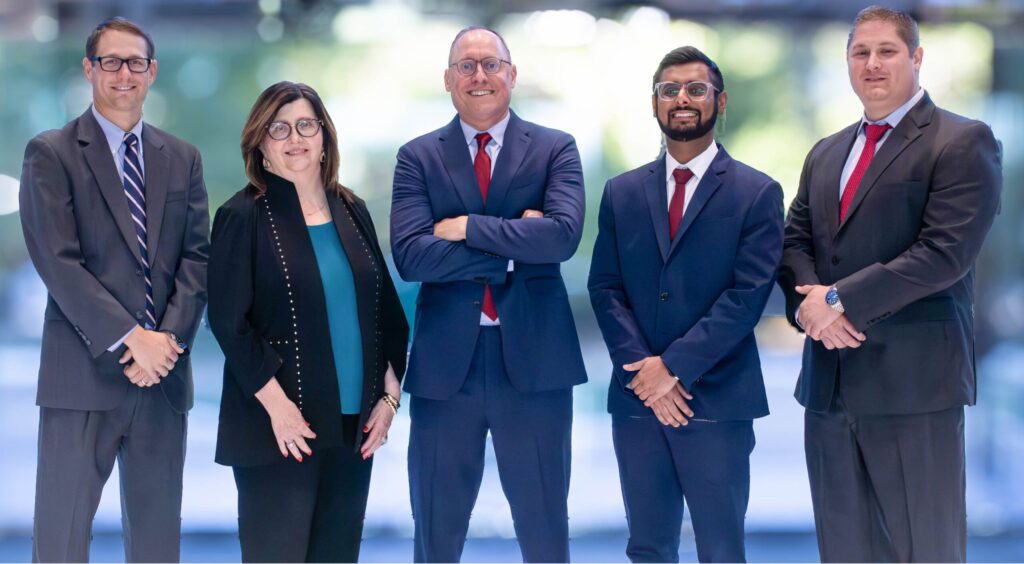
Truck Accident Claims Involve Corporate Defendants and Complex Insurance Structures
Truck accident cases differ from standard motor vehicle collisions. They often involve large corporate defendants, multiple insurance policies, and regulations from the Federal Motor Carrier Safety Administration (FMCSA). The consequences of an improperly handled claim can be substantial, particularly when insurers attempt to shift blame or undervalue injuries.
Legal Representation for Victims of Commercial Trucking Negligence in Georgia
Hasner Law provides focused representation for individuals who have been harmed by negligent truck drivers, unsafe commercial vehicle operations, or logistics company practices. Our law firm has recovered millions of dollars for clients across Georgia, and we are prepared to pursue claims against local, regional, or national trucking entities.
Structured Case Development Built on Liability, Evidence, and Federal Safety Rules
Each case is developed through a structured approach, including liability analysis, medical documentation, and a review of applicable traffic and safety regulations. Clients are kept informed at every stage of the process. The legal team is accessible to discuss case progress, answer questions, and prepare for either settlement discussions or litigation.
Contingency Fee Representation With Local and Bilingual Legal Access
Hasner Law accepts truck accident cases on a contingency fee basis. This means clients pay no legal fees unless compensation is recovered. This arrangement allows individuals and families to pursue justice without taking on additional financial risk. Our law firm also offers bilingual services for Spanish-speaking clients and serves individuals throughout Kennesaw and neighboring areas in Cobb County.
In-House Legal Advocacy Focused on Full Compensation, Not Quick Settlements
Hasner Law is not a referral service. Each case is handled in-house and developed for maximum recovery. The firm does not recommend settlement unless it reflects the full scope of the client’s physical, emotional, and financial harm. When negotiation fails, the attorneys prepare to present the case in court.
Common Causes of Truck Accidents in Kennesaw
Large trucks operate under conditions that increase the risk of collisions. Driver fatigue, long braking distances, and large blind spots are all contributing factors. When these risks are combined with carelessness or regulatory violations, serious injury often results.
Several common causes of truck crashes in the Kennesaw area include:
- Failure to yield at intersections or on highway ramps
Trucks require more space and time to maneuver. Failure to yield often leads to T-bone or sideswipe collisions. - Improper lane changes or turns
Large commercial vehicles have limited visibility along their sides. Truck drivers may merge into adjacent lanes without adequate clearance and cause an impact. - Driver distraction
Handheld devices, navigation systems, or communication equipment can result in delayed reaction times or missed traffic cues. - Excessive speed or following too closely
Trucks exceeding posted limits or not allowing adequate stopping distance may cause rear-end crashes in slowed or congested traffic. - Driving under the influence
Some commercial vehicle crashes involve drivers who test positive for alcohol or controlled substances. These cases may also support claims for punitive damages. - Equipment failure or maintenance issues
Poorly maintained brakes, tires, or lighting systems contribute to many collisions. Sometimes, liability may extend to the employer or third-party maintenance providers. - Improper cargo loading
Shifting loads or overweight trailers can cause rollovers, jackknife incidents, or loss of control.
External conditions, in addition to driver conduct, may contribute to a truck accident. These include construction zones, unmarked hazards, or inadequate roadway signage. In such cases, further investigation may reveal government liability or design-related fault.
Commercial truck accidents in Kennesaw are typically reported through the Cobb County Police Department or the Georgia State Patrol. The official report is often the first step in assessing fault. However, additional documentation, such as vehicle inspection logs, dash cam footage, and black box data, may be necessary to determine whether FMCSA rules were violated or safety protocols ignored.
What Compensation Is Available After a Truck Accident in Kennesaw?

Truck accident victims in Georgia may be eligible to recover damages for various losses. These include both tangible financial harm and less quantifiable emotional or physical impacts. Under Georgia law, damages may be classified as economic, non-economic, or punitive.
Economic Damages
These direct financial losses can be documented with bills, pay stubs, or service invoices. Common examples include:
- Emergency medical care and hospital stays
- Surgical procedures, diagnostic imaging, and specialist follow-up
- Physical therapy, prescriptions, and assistive devices
- Lost income from time away from work
- Reduced future earning ability due to disability or permanent impairment
- Repair or replacement costs for personal property, including vehicles
- Transportation expenses, home healthcare, or necessary renovations
Non-Economic Damages
These reflect personal harm not tied to specific dollar amounts but recognized under Georgia injury law:
- Past and future pain and physical suffering
- Emotional distress or psychological trauma
- Loss of daily function or reduced enjoyment of life
- Permanent disfigurement or scarring
- Loss of companionship in certain wrongful death or spousal claims
Punitive Damages
In rare circumstances, a court may award punitive damages to penalize the defendant for gross negligence or intentional misconduct. These damages are not compensatory but intended to deter repeat behavior. In Georgia, punitive damages are generally capped at $250,000 unless the at-fault party was operating a vehicle under the influence of drugs or alcohol, in which case the cap does not apply.
Each category of damages must be supported by documentation. This may include medical records, insurance forms, employer verifications, and statements from treating providers. In larger cases, economists or vocational experts may be consulted to quantify projected losses or diminished capacity.
Insurance companies may dispute the amount of damages by arguing that the injuries were pre-existing, unrelated, or not severe. Early legal involvement ensures that all categories of harm are preserved, documented, and presented with supporting evidence.
Who May Be Held Liable in a Georgia Truck Accident Claim
Truck accident liability often involves more than the driver’s conduct. Commercial vehicle operations rely on layered relationships between drivers, employers, logistics providers, and third-party contractors. Determining who is legally responsible requires thoroughly evaluating who had a duty of care, how that duty was breached, and whether the breach caused the injury.
Commonly Liable Parties in a Truck Wreck
- Truck drivers who violate traffic laws, operate while impaired, or fail to observe safety regulations
- Employers or trucking companies who schedule routes beyond federal hour limits, fail to maintain equipment, or hire unqualified drivers
- Cargo loaders who irresponsibly or improperly secure or overweight loads that contribute to rollover or loss-of-control events
- Maintenance providers who neglect necessary inspections or fail to repair mechanical defects
- Vehicle or part manufacturers in cases involving faulty brakes, tires, steering components, or trailer couplings
- Government agencies or contractors should investigate when road design flaws, lack of signage, or poor surface conditions contribute to the crash
Georgia applies a modified comparative fault rule, codified at O.C.G.A. § 51-12-33, which allows an injured person to recover damages if their assigned fault does not equal or exceed 50 percent.
Identifying every responsible party in multi-defendant claims broadens access to insurance policies and increases the likelihood of full compensation. Liability analysis is based on evidence such as electronic logging data, dispatch records, inspection reports, and industry compliance logs.
What is the Legal Process for Filing a Truck Accident Claim in Kennesaw?

Filing a claim after a truck accident in Georgia begins with identifying liable parties and documenting damages. While many claims start with the at-fault driver’s insurer, the process may involve several entities with overlapping responsibilities.
Preserving evidence. Photographs, repair records, and vehicle damage inspections should be secured early. Electronic control module (ECM) data and GPS logs from the commercial vehicle should also be preserved.
Medical evaluation and treatment documentation. Records from all treating providers, including emergency care, orthopedic specialists, physical therapists, and pain management teams, should be collected.
Demand letter submission. Once medical treatment stabilizes or concludes, a demand package outlining the basis for liability, the injuries sustained, and the requested compensation is sent to the insurer.
Negotiations and pre-litigation review. The insurer may issue a counteroffer or deny liability. If a settlement is not reached, a lawsuit may be filed in the Cobb County State Court or the Cobb County Superior Court, depending on the monetary amount and legal issues involved.
Litigation. Litigation includes pre-trial motions, discovery (interrogatories, depositions, document requests), court status conferences, and—if necessary—a jury trial.
Throughout the process, legal representation manages correspondence with opposing counsel, prepares legal documents, and presents evidence per Georgia’s procedural rules.
Time Limits to File a Truck Accident Lawsuit in Georgia
Georgia law imposes a strict deadline on personal injury claims. Under O.C.G.A. § 9-3-33, individuals generally have two years from the date of the accident to file a lawsuit for bodily injury or wrongful death. If this period expires, the court will dismiss the claim regardless of the evidence presented.
The Legal Exceptions That May Apply in a Truck Accident
- Minors. If the injured person is under 18 at the time of the crash, the statute of limitations may be tolled until their 18th birthday.
- Mental or physical incapacity. The time limit may be extended when someone cannot manage their legal affairs due to impairment.
- Delayed discovery. In rare cases where an injury is not immediately apparent, the filing period may begin upon discovery rather than the crash date.
- Claims involving public agencies. If the at-fault party is a government vehicle or employee, an administrative notice (ante litem notice) must be filed within six months for city claims and within one year for state-level claims.
Compliance with these deadlines is strictly enforced. Late filings are dismissed, even in serious injuries or clear negligence cases. Early legal review can ensure that procedural requirements are met and preserved throughout the claims process.
What to Do After a Truck Accident in Kennesaw

Your medical care should continue as prescribed if you are recovering at home or hospitalized after a truck collision. From a legal standpoint, this period is also essential for claim preparation and case development.
Next Steps After Initial Treatment
- Contact legal representation
An attorney can initiate communication with the trucking company’s insurer, prevent early settlement tactics, and protect claim value from the outset. - Secure documentation
Collect discharge papers, insurance explanation of benefits (EOBs), physical therapy referrals, and any communication from opposing insurers. These items help establish causation and financial loss. - Avoid direct communication with insurance adjusters
Statements to insurance representatives can be recorded and used to dispute liability or damages. Refer all inquiries to your attorney. - Track financial and physical impacts
Document days missed from work, out-of-pocket costs, pain symptoms, and daily limitations. This evidence strengthens the demand for non-economic and wage-related damages. - Prepare for negotiations or litigation
Your legal team will gather evidence, consult with accident reconstruction professionals if necessary, and assess whether the matter should proceed to court or be resolved through settlement.
Taking timely action during this stage can influence the long-term outcome of your claim.
Schedule a Free Consultation With a Truck Accident Attorney in Kennesaw
Truck accident claims involve multiple parties, commercial insurance policies, and regulations that do not apply to standard vehicle collisions. If you were injured in a truck accident near Kennesaw, Hasner Law can help evaluate your claim, explain your legal options, and pursue compensation through settlement or litigation.
We have the resources to pursue claims against large carriers, national corporations, and insurers with aggressive defense teams. Cases are evaluated individually based on their legal merit, and every effort is made to secure a recovery that reflects the full extent of your damages.
There is no charge to schedule a case evaluation. Appointments are available by phone or through the firm’s online contact form. During your consultation, a skilled Kennesaw truck accident attorney will review the facts of your accident, identify potential defendants, and explain the next steps based on Georgia law.
For a free consultation with a personal injury attorney in Kennesaw, call Hasner Law at 678-293-0284 today.




